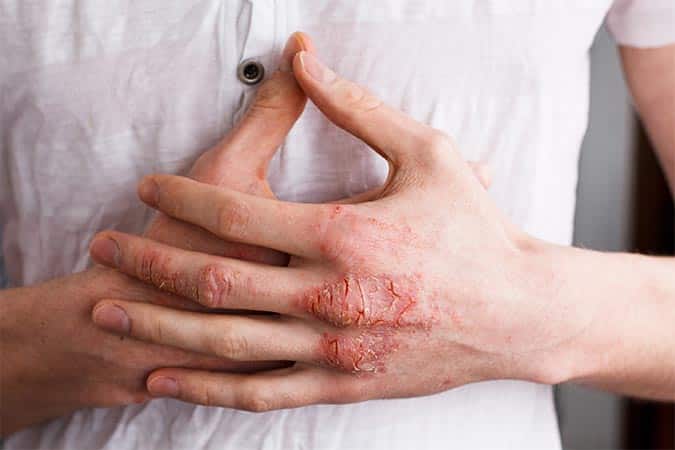What is Eczema?
Atopic dermatitis, also known as eczema, is a condition that causes the skin to become red and itchy. It is a chronic condition that flares periodically and then clears up for a period of time. This condition is common in infants and children but can occur at any age. Eczema is related to a gene variation that affects your skin’s ability to retain moisture and provide protection from bacteria, allergens, and irritants. Individuals with a family history of eczema, hay fever, asthma, or allergies are at a higher risk for this condition.
Common eczema symptoms include:
- Dry, itchy skin
- Red or brown-gray patches of skin
- Small, raised bumps that, when scratched, may leak fluid and crust over
- Thick, scaly, cracked skin
- Raw, swollen, sensitive skin due to scratching
Who is a Good Candidate for Eczema Treatment?
Individuals with eczema that causes itching, discomfort, pain, or self-consciousness can benefit from eczema treatment. An assessment is needed by one of our dermatologists to diagnose and treat eczema. Contact our office today to schedule a consultation.

Recommended Product
Vanicream Moisturizing Cream
Helps restore and maintain a normal moisture level. Soothes red, irritated, cracking, or itchy skin. The ideal moisturizing formula for dry skin associated with atopic dermatitis (eczema), psoriasis, ichthyosis, and winter itch.
What to Expect During Eczema Treatment?
There is currently no cure for eczema, but there are many treatments available to help prevent symptoms and new outbreaks. Treatment options include:
- Medications
- Creams to control itching and inflammation: Corticosteroid creams or ointments may be prescribed. For severe eczema, wrapping the affected area with topical corticosteroids and wet bandages can be effective in improving symptoms. Other creams containing calcineurin inhibitors or phosphodiesterase inhibitors target the immune system to control the skin reaction. Be sure to follow your dermatologist’s instructions on how to properly use these medications.
- Medications to fight infection: Antibiotic creams may be prescribed if your skin has open sores, cracks, or bacterial infections. Oral antibiotics may also be recommended.
- Oral drugs to control inflammation: For severe eczema, oral corticosteroids such as prednisone may be prescribed. These drugs are very effective, but cannot be taken long-term due to potentially serious side effects. Other oral therapies our group utilizes include cyclosporine, methotrexate, mycophenolate mofetil, and azathioprine.
- Biologic therapy: The FDA has approved dupilumab (Dupixent) as an injectable biologic for uncontrolled moderate-severe atopic dermatitis (eczema). It is used for those *6 months of age* and older who do not respond well to other standard treatments. Another injectable biologic option for adult patients is tralokinumab (Adbry).
- JAK inhibitors: Opzelura cream (ruxolitinib), Rinvoq (upadacitinib), and Cibinqo (abrocitinib) are used to treat more advanced cases of atopic dermatitis.
- In-Office Therapy
- Phototherapy: This light therapy involves exposing the skin to controlled and specific wavelengths of ultraviolet light. Our office primarily utilizes advanced narrow-band ultraviolet B phototherapy to treat our eczema patients. We have been South Jersey’s leader in phototherapy treatments for over 30 years.
Eczema FAQs
At what age does eczema go away?
Can eczema be caused by stress?
Can eczema be a sign of cancer?
Can eczema make you feel tired?
Can eczema be a sign of something else?
Can eczema be caused by hypothyroidism?
Do I have eczema or psoriasis?
Does eczema get worse as you age?
Does eczema get worse in the winter?
How long does it take for eczema flare up to clear?
Following Eczema Treatment
Following eczema treatment, patients will notice an improvement in their eczema symptoms and the appearance of the skin. Your dermatologist will instruct you on how to properly go about your treatment for the best possible results. Do not hesitate to contact our office regarding post-treatment questions.
Schedule a Consultation
To learn more about eczema treatments at HMGS Dermatology, contact our office today to schedule a consultation appointment. Our team will be happy to answer any questions that you may have.

Get Started With A Visit!
Fill out the form below and we will reach out to you shortly to schedule an appointment.